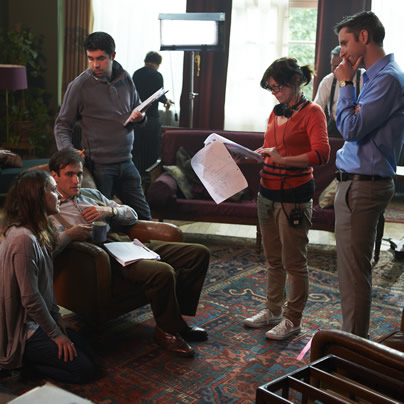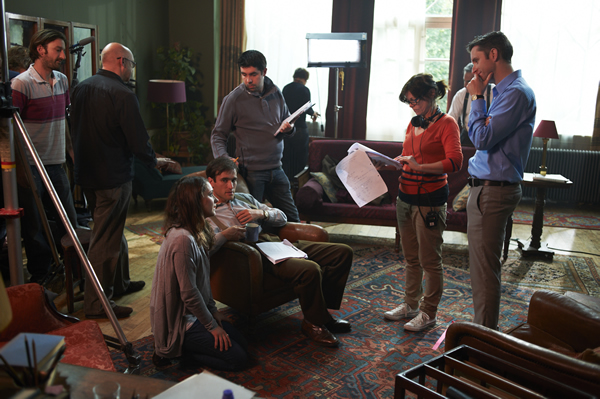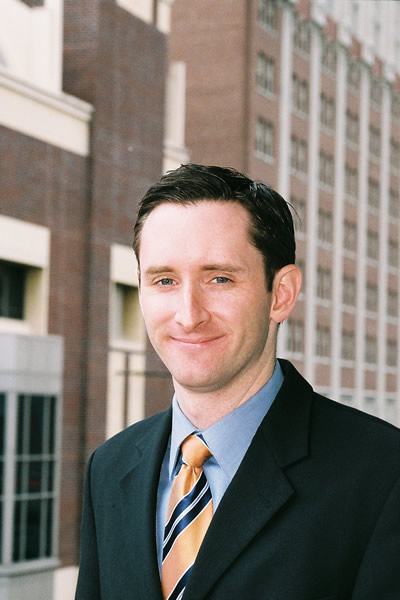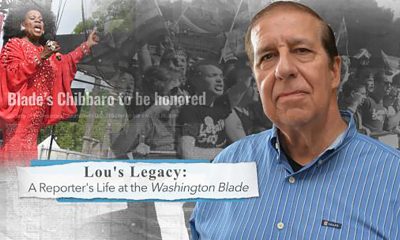Arts & Entertainment
Tragic hero
Film tells story of Alan Turing — from cracking Nazi code, to chemical castration and suicide


Patrick Sammon, right, on the set of his new docu-drama ‘Codebreaker’ in London. (Photo by Marc Sethi)
Scientist cracks codes to help defeat Germany during World War II, essentially laying the groundwork for modern computer science, but is busted for being gay and in 1950s England is chemically castrated and eventually commits suicide.
It’s a tragedy of epic proportions but such is the little-heard biography of Alan Turing. A new 81-minute docudrama about his life called “Codebreaker” debuts next week in Washington.
Novice filmmaker Patrick Sammon — a former executive director of the Log Cabin Republicans — says Turing’s story needs to be told.
“As I sorted through my hundred ideas,” Sammon says, “Turing’s idea quickly came to the top of the pile, because it was an amazing story, and I thought everyone should know about Turing’s contribution to our world. And then I realized there really hadn’t been a film like this done about him.”
The film (turingfilm.com) was released in the U.K. last year. Its U.S. premiere is Wednesday at the Georgetown AMC. It’s sponsored by the D.C. Center and tickets are available to the public (todpix.com/codebreaker). An advance screening and discussion were held last week at the National Press Club on the centenary of Turing’s birth and the film will also screen in New York on Oct. 25. Beyond that, TODpix, a distribution company, is working with grassroots organizations across the country to find audiences for additional showings.
Sammon, who’s gay, hopes to reach pockets of both the LGBT and tech communities to build a demand for additional screenings, culminating in “A Night with Alan Turing,” featuring screenings in 50 cities on Nov. 8.
Turing grew up in England in the early 20th century. He quickly stood out as a bright student and his teachers praised his “considerable powers of reasoning.” He developed a strong bond with fellow student Christopher Morcom. According to David Leavitt, novelist and Turing historian, “Morcom was, I think, more important to Turing than any other human being in his life. Turing was probably, in an adolescent way, quite in love with him.”
When Morcom died at a young age, Turing delved into his work as a sort of tribute to his late friend. As years passed, Turing developed the idea of the computer, broke encrypted German army messages during World War II and laid the groundwork for the future of artificial intelligence and mathematical biology.
Later in life, Turing had an affair with a 19-year-old named Arnold Murray, a friend of whose burgled Turing’s house early in 1952. Turing reported the crime, and the circumstances surrounding it, to the police. At the time, homosexuality was illegal in England and they charged Turing with indecency. Turing opted for hormonal treatment over prison, resulting in serious physical and mental side effects. Shortly after ending treatment, Turing committed suicide at the age of 41.
Sammon moved to Washington in 2003 to become a documentary filmmaker, but his career took a detour when he began working for, and ultimately running, the Log Cabin Republicans, a conservative organization that advocates for equal rights for the LGBT community. During this time, Sammon amassed many ideas for films. When he launched Story Center Productions in 2009, he partnered with a U.K.-based production company to help with his first film, “Codebreaker.”
He spent about six months in London during the production, which he’s been focused on full time since 2010. He factored in some living expenses into the production cost, which was funded largely from Channel 4 in the U.K. and also on his savings. Other donors, foundations and corporations including Intel and Google helped finance the project.
Sammon calls the film a “drama-documentary,” saying, “A third of it is drama, recreation, and then two-thirds is documentary. It’s a good mix of those two elements, and I think they play well together.”
It features a myriad of interviews with Turing’s relatives and associates, historians and industry professionals. His work is widely recognized as the foundation of all modern-day technology. In the film, Google’s Alma Whitten describes his contributions as timeless, saying, “They’re the things that are fundamentally true, so they’re always going to be with us, in the same way that the things that Galileo and Newton contributed to physics are always going to be with us.”
Apple co-founder Steve Wozniak credits Turing with making possible all subsequent technology. “Alan Turing was sort of at the top of everything that ever developed,” Wozniak says in the film. “All the future research that was done by people, building real equipment that can compute.”
The interviews are juxtaposed with dramatizations of therapy sessions from Turing’s last year, while Turing was undergoing chemical castration. Ed Stoppard (“Upstairs, Downstairs”) plays Turing opposite Henry Goodman (“Taking Woodstock”) as Franz Greenbaum, Turing’s psychiatrist and friend.
Production for the dramatizations lasted only five days, but Stoppard’s performance is a stand-out piece of the film. He dramatizes the internal struggle that drove Turing to take his own life. Stoppard’s sometime-sardonic, sometimes-reflective comments mask a pain his character carried with him.
Sammon’s passion for the story stemmed from the injustice Turing faced despite his contributions to society.
“Here you have someone who is one of the key people who helped the Allies win World War II by breaking Germany’s naval enigma code,” Sammon says. “Then you have the technology world really giving Turing credit for creating the intellectual foundation for modern computer science. The paper he wrote in 1936 really laid down the key ideas for the modern computer.”
Sammon goes on to describe the “Shakespearean tragedy” that followed. “In spite of his genius, in spite of his amazing contribution to the war, the fact that he was gay, the government persecuted him because of it.”
During the course of a year of chemical castration, Turing took daily doses of estrogen. Effects of the treatment included shrunken testicles, a loss of his libido, a loss of body hair and the development of breasts. Months after the treatment ended, Turing’s body had not returned to its normal state. Sammon believes Turing elected the hormone therapy, in place of a year in prison, to avoid being taken away from his work.
Sammon, who says he has “a lot of other ideas” for future film projects though he’s focused on the “Codebreaker” distribution for now, says it’s important to recognize the historical accomplishments of the LGBT community and foster a more inclusive society. At the same time, he believes all people, regardless of sexual orientation, should admire Turing as a hero and a genius.
“I admire him very much because he was unconventional,” Sammon says. “I respect Turing for the fact of how unconventional he was, and he wasn’t afraid to be different. The sad part is society, at the time, didn’t have tolerance for differences.”
Leavitt describes Turing as a tragic hero we must learn from.
“His refusal to compromise or lie, under such circumstances, was nothing less than heroic — yet we must remember that, as a consequence of his heroism, he was erased from history for many years. Nor is the institutionalized hatred of gay men and lesbians any less of a reality today than it was in 1953. Even as we honor Alan Turing, we must be vigilant. We must not let ourselves lapse into complacency. This could happen again.”
Sports
Trans cyclist’s victory sparks outrage in conservative media
Katheryn Phillips is originally from DC

On the heels of UPenn erasing the record of the first openly transgender NCAA Division I All-American swimmer and the U.S. Supreme Court’s decision to tackle bans on trans student-athletes, right wing media is now all hot and bothered about the latest trans woman who won a cycling championship — even though she competed according to the rules.
On Tuesday, 58-year-old Katheryn Phillips finished first in USA Cycling’s Lyons Masters National Championship race for women aged 55-59, with a time of 1:42:10, according to the official results posted by the organization. The record shows her gender as “F” for female.
One second behind Phillips was Julie Peterson, with a time of 1:42:11 — as were three other cyclists: Mary Beth Grier, Andrea Cherniak-Tyson, and Carolyn Maddox.
Peterson, 57, was so outraged, she told Fox News she refused to stand on the podium in second place next to Phillips. Her story was swiftly shared by the New York Post (also owned by Fox’s parent company News Corp.), the Daily Mail, Breitbart, and other conservative media.
Both Peterson and another competitor are accusing USA Cycling of “hiding” that a transgender woman had registered to race.
“It was hidden from us. Katheryn Phillips, KJ’s name, was not on that list. And I checked it up all the way to the point of closure when we couldn’t register online anymore,” Debbie Milne told Fox.
“If I had known, I wouldn’t have spent thousands of dollars in travel and time off work to come and do a race,” Peterson said. Fox welcomed Milne, 56, who finished seventh on Tuesday, to Fox & Friends Thursday morning.
(Video courtesy of Fox News)
Peterson told Fox she did complain to USA Cycling officials prior to the race. Both Milne and Peterson referred to Phillips as a male, and with “he/him” pronouns.
“To be fair to all humans, if we want to say ‘him’ or ‘her,’ he was born a biological male, that is a fact,” Milne said. “And that is the thing that makes it an unfair advantage. Whatever has happened after that is a whole different topic.”
“I said, ‘I don’t want to race against a man,’ and they quickly scolded me and said ‘Oh, you can’t call him a man,’ and I’m like ‘Well, he is a man,’ so I was quickly scolded and corrected that it is a woman and I don’t even know what to say.”
USA Cycling did not respond to the Washington Blade’s emails requesting comment.
Phillips, who goes by Kate and by “KJ,” is a former rugby player with the D.C. Furries, who stated in the comments of a 2024 article published by Zwift Insider that she was the first out trans athlete in the U.S. to compete under the 2004 International Olympic Committee’s guidelines on trans participation.
“When USA Rugby told me about the IOC decision in 2004, I raised my hand to be included. I experience nothing but joy when I play, ride, and race,” Phillips said.
As the Blade has reported, the International Olympic Committee drastically revised those rules in 2021, and in March, Republican lawmakers in D.C. demanded the IOC ban trans female athletes from women’s sporting events altogether.
The Blade also reached out to Phillips for comment but as of press time we have not received a response. She told Zwift Insider in March 2024 she does not let those who disapprove or spread hate impact her performance or her attitude.
“I am unaffected by dissent. I love, I share joy, I am me, and I have been my authentic self for decades,” she said. It’s been reported Phillips came out in 1999, and told Zwift Insider she considers herself a lifelong cyclist.
“I’ve been on a bike for as long as I can remember,” said Phillips. “As kids, my friends and I rode all over town, we were feral kids; no cell phones, no trackers … we just roamed, and nobody got in trouble or hurt bad enough not to ride home … Scrapes/bruises/cuts were not an issue for us. In my teens, I worked for myself as a court/legal messenger, doing all of the work via my bike until I got a car. Raced BMX as a kiddo (when I mowed lawns to cover the race entry fees), I did MTB stuff (non-racing) and Sprint/Olympic Triathlons in my 30’s, and now I’m racing on Zwift, Road/Gravel, and CX in my 50s.”
In the comments section, Phillips made clear she’s not competing to win.
“I don’t do sports for victory, I do it because like many other women, I am an athlete to my core,” she said. “Unlike some, I am not there to WIN, I am there to do my best with the competitors and teammates I have around me trying to do the same…we are in it for the experience. I rejoice in their wins, and a lot of joy is reflected back to me when I have a good day.”
Celebrity News
Nina West’s ‘Sugar in the Tank’ tour comes to Rehoboth Beach
Drag Race’ contestant will be at Clear Space Theater Company on July 6

Nina West, a drag queen known for competing on “RuPaul’s Drag Race,” is currently on her ‘Sugar in the Tank’ tour around U.S. cities.
With previous shows in Key West, Fla., New York, and hometown of Columbus, Ohio, the tour is staying put in Provincetown, Mass., from late July to early September. It will make a stop at Clear Space Theater Company in Rehoboth Beach, Del., as part of a summer cabaret series on July 6.
Andrew Levitt has been performing as Nina West for 25 years, who got her rise from starring in “Drag Race” Season 11, where she placed sixth and won Miss Congeniality, a title awarded to the contestant who is regarded as the kindest and most helpful one of that season.
West has toured “Hairspray” on Broadway as Edna Turnblad, starred in a couple of feature films and published a children’s book titled ‘The You Kind of Kind.’
Levitt said he wrote this show in response to attacks from the government towards the LGBTQ community.
“‘Sugar in the Tank’ is a big old gay fabulous summer musical,” Levitt told the Washington Blade. “The show is a response to the darkness that I think has fallen over a lot of people in the country and it’s hopefully trying to bring a little bit of light and a little bit of joy.”
“Sugar in the Tank” is a Southern euphemism for gay, often holding a negative connotation. Levitt said he wanted to “reclaim and embrace” queerness in times when some people want to take that away.
Levitt said he knew he would be traveling to predominantly queer destinations like Key West and Provincetown for these shows and that was always at the forefront of his mind when writing “Sugar in the Tank.”
This will be Levitt’s first time in Rehoboth Beach. Clear Space Theater is considered Delaware’s second-largest professional non-profit theater and the state’s most prolific producer of professional theater. The space seats just 170 patrons and Levitt said he loves the intimacy of a small venue and that it’s his favorite way to do a show.
“Stages like this size are the perfect size for me because it allows for me to really showcase my talents,” Levitt said.
Levitt founded the Nina West Foundation in 2015 to uplift and sustain the central Ohio LGBTQ community, which has raised more than $3 million for various organizations. He said he makes activism part of the entertainment in his career.
“That’s the nuance of what drag is. We can be ridiculous for fun and we can be serious but it’s all wrapped up into one thing,” Levitt said. “I think that can be the power of it.”
Levitt said West is so much more confident now than when he first started performing as her. He didn’t know where his voice belonged in the community in the past, but because of those who came before him in this art form, he has learned to harness the power of the stage and the power of the wig to be able to tell stories.
“I really love my community. I love queer people. I love who we are and what we represent,” Levitt said. “Knowing our history and knowing that we’ve been through a lot, I’m really thrilled that as a queen, I can use my voice and my platform to help try to better our community, not try to speak for everyone but try to lend voice to people who desperately need it.”
Levitt’s advice to young queer artists is to not give up on yourself, surround yourself with supportive people and allow yourself the opportunity and space to fail, to ask questions, and to not give up.
“Our young people have got to be told they matter,” Levitt said. “Oftentimes, people are told that they don’t matter, that their voice doesn’t matter, that they cannot make a difference and I want to remind every single person who’s doing this that they do matter, they can make a difference, their voice is intrinsic to who we are as a community.”
If Sugar in the Tank was a drink, it would be a Bahama Mama or Sex on the Beach, said Levitt, because they are delicious, juicy, and sugary, just like the show.
“I just want everyone to know that they should come to ‘Sugar in the Tank’ and experience a show that’s built on joy and levity and silliness and fun and come have some fun with me and show me the fabulous love of Rehoboth Beach,” Levitt said. “I can’t wait.”

The Rainbow History Project will host “Pickets, Protests and Parade Exhibit Tour” at 7 p.m. at Freedom Plaza. This event honors the courage, resilience and resistance of D.C.’s gay community. For more details, visit Eventbrite.
Go Gay DC will host “LGBTQ Community Social” at 7 p.m. at Hyatt Centric Arlington (1325 Wilson Blvd.). This fun event is ideal for meeting new people and community building. Attendance is free and more details are available on Eventbrite.
Xavier Entertainment DC will host “Cowboy Carter Afterparty” at 10 p.m. at Nellie’s Sports Bar. There will be fireworks, parades, and patriotic fun. For more details, visit Eventbrite.
Mezcal Amaras will host “Sha Boing Boing Showdown” at 6 p.m. at Snappy’s Small Bar (3917 Georgia Ave., N.W.). Get ready to test your hotdog eating abilities. Tickets start at $12.51 and can be purchased on Eventbrite.
Illusions Drag Queen Show will host “Drag Queen Dinner Show” at 7 p.m. at 2323 18th St. N.W. Guests will be treated to the very best celebrity drag impersonations in entertainment. Tickets start at $12.97 and are available on Eventbrite.
Thurst Lounge will host “A Thirsty Cowboy Afterparty” at 5 p.m. DJ Apollo will be performing. For more details, visit Thurst’s website.
9:30 Club will host “Gimme Gimme Disco: A Dance Party Inspired by ABBA” at 9 p.m. The DJ will play plenty of disco hits from the 70s and 80s. Tickets cost $45.30 and can be purchased on Ticketmaster.

















